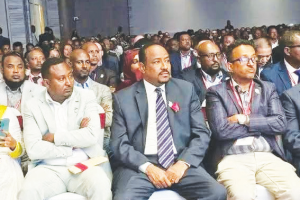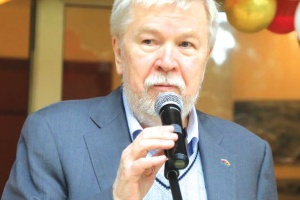BY MULUGETA GUDETA
The cases of Afework Tekle and Mulatu Astatke are telling indictments of the Ethiopian public’s neglect of two of the its artistic geniuses who did a lot for the good reputation of the country. Regrettably, both of them did not receive adequate recognition from the domestic public in return for their lifelong efforts.
These two individuals are almost household names yet they are not given the respect and appreciation their long careers and immortal works have added to the stature of the nation.
As legendary marathoner Abebe Bikila is emblematic of Ethiopia’s success on the world stage, so is Afewerk Tekle who shined in his time is also symbolic of how far Ethiopians can go on the international art stage and rival their European peers.
Biographies are written about heroes of the various battles while the heroes of achievements scored in peaceful times, and for the betterment of society, such as philanthropists, humanists and philosophers attract little attention. In our culture we are respectful of great achievers but we often neglect or undermine some of them while overrating others.
It is good to immortalize genuine national war heroes who fought for the survival of the nation. It is also important to elevate all those heroes of labor, authors of scientific inventions and high performers in the arts, and the sciences should be respected because they too deserve the status of heroes in their own ways.
The popular Amahric adage that nebiy behageru ayikeberem, meaning that a prophet is not respected in his own country, is befitting the unenviable fate of many of the nation’s unsung heroes who worked hard in relative obscurity, achieved success outside their homeland and although they are ignored or unknown by their domestic public.
The Diaspora is full of such neglected heroes who have reached the highest point of a career in science, medicine, the humanities while they silently do their works, live and die in foreign countries without anyone bothering to remember them or claim their heritages.
We can name names in almost any field of artistic endeavor. Solomon Deressa is a famous Ethiopian bard who composed some of the most memorable lines in Amharic poetry although he was from Oromo ancestry. Arts and literature have no ethnic identity. Solomon lived in the United States, taught literature there and passed away in total obscurity as the domestic literary audience had little knowledge of his life and works.
Skunder Bogossian, the most important Ethiopia abstract or modernist painter also lived most of his life abroad and died there without anyone caring about him after he passed away. The country’s only poet laureate, Tsegaye Gebremedhin, who can legitimately be called the “Shakespeare of Ethiopia” died in exile in obscure circumstances and his remains were transported and buried here without public attendance.
Tsegay too was of mixed ancestry with both Oromo and Amhara parents and served as a strong link between the two cultures sand communities. These people were instrumental in shaping an Ethiopian artistic identity and have contributed to social coherence.
The few artists mentioned above did not leave their country in search of better life or Western comfort. Most of them were driven out of their native land by the authorities of the time or because their personal beliefs that made their presence here difficult to bear and were subsequently pushed into exile.
There were also the unfortunates ones like Abe Gubegna and Be’alu Girma two of the most outspoken writers the country has produced in the 1960s who perished before their times here at home under mysterious circumstances. Their remains were buried in unmarked graves and their memories are fading from the public imagination.
Be’alu’s disappearance under the Derg regime is still a national conundrum. His name was not even mentioned when those of thousands of the victims of the Derg terror were remember in a public ceremony and a museum is built in their memory.
In the modern world of celebrity worship, artists and writers are as much important to their countries and societies as engineers, politicians, doctors, scientists and lawyers although the former claim the headlines rarely while the latter are targets of daily public attention, public gossip and adulation. The fate of most artists is however tragic of not regrettable to say the least.
The general state of neglect these artists is not only a societal malaise. It is also a kind if media failure to acquaint these individuals to the home public and help them attaint a status commensurate with their contribution to the country’s good reputation.
The trouble with Ethiopian culture in general is that it elevates these celebrities to the status of sainthood only when they leave this world for good; during their burial or the various rituals that accompany their departures. National culture does not recognize worthy artists or any other celebrity when they are still alive and kicking.
Famous Ethiopian dramatist and poet Mengistu Lemma lived in deplorable conditions and died a loner forgotten by society and visited by a handful of his former students at Addis Ababa university where he taught for many years. When he fell ill and his former students went to visit him at his “home”, Mengistu Lemma was a shadow of his former self and almost a pauper about whom nobody cared.
The same can be said about Dr. Yonas Admassu, the distinguished man of letters and researcher who lived alone and was found dead in his apartment three days after he passed away. And no one remembers his contribution to Amharic literature and literary discourse in the country. Of all the institutions, Addis Ababa University should have prepared the biographies of such prominent individuals and handed them over to posterity before they are totally forgotten as if they never existed. This could have been a starting point for a culture that honors its respectable sons and daughters.
There are at present many Diaspora Ethiopians who have distinguished themselves in various fields of endeavors. Yet, they remain anonymous to the new generation of young Ethiopians who are badly needing them as role models worthy of emulation.
The National Aeronautics and Space Agency(NASA) in the United States hires a number of distinguished Ethiopian space scientists who are making immense contribution to space exploration and space travel. However, they remain unknown to the home public that should feel proud of these individuals so that members of the upcoming generation could learn from their lives.
In the fields of visual arts and the cinema, extremely talented people like distinguished filmmaker Haile Gerima and his colleagues occasionally speak to the media although their ideas might sometimes be non-conformist or deviating from what is considered here normal or conventional. Yet their works are highly appreciated abroad and they are the winners of many awards of distinction.
There are a number of young and upcoming writers in the Dispora. Dinaw Mengistu and Meaza Mengiste and Hama Tuma are three of the many distinguished writes whose works are sought by famous publishing houses in the West.
Yet, here at home they are not only available in print but their names are rarely mentioned as if they are citizens of another country. However most of them considered themselves Ethiopians even after they hold foreign passports or are citizens of other countries.
Higher educational institutions could for instance invite these famous writers whenever they are on sabbatical leave and acquaint them with youngsters here at home so that they get some kind of inspiration from them.
They should be invited to speak at many forums and share their experiences with local artists who aspire to go abroad for studies. Some of the Ethiopian celebrities abroad may not speak the local languages but they are still Ethiopians in their hearts and need to be embraced as such instead of suffering neglect as they do now.
Afewerk Tekle died a few years back and his residence is said to be converted into a museum. Then what happened? We are left in the dark. How are his works kept protected? Who is going to write a definitive biography of one of the foremost Ethiopian painters of the 20th century? Who is going to take care of his legacy? Is there a foundation in his name that would take his legacy forward and contribute to the emergence of future Afeworks?
Even when the media speak about him, they usually focus on mundane aspects of his interesting life and ignore or they don’t know, Afework the artist whose contemporaries were giants like Picasso and Gauguin. He is rather less and less remembered while he should be a permanent talking point in arts and media circles.
Professor Claude Sumner a Canadian by birth but and an ardent Ethiopian deep in his heart who spent most his life unearthing Ethiopian philosophy and literature and making it available to the world has a university faculty in his name in Switzerland where Ethiopian philosophy and the philosophy of Zara Yacob are studied .
Here in Ethiopia, he has been reduced to a kind of philosophical nonentity, overlooked neglected and even sometimes abused by some self-proclaimed philosophers who deny the existence of Ethiopian or African philosophy.
Once again, academia should have come to the rescue of famous intellectuals like Professor Sumner and other Ethiopians or Ethiopianists who gave their working lives to the nation’s good reputation.
The late Professor Richard Pankhurst may be the next likely victim of this kind of academic dementia that might erase from the national memory the great personalities who have contributed to Ethiopia’s positive image and respect in the world.
The Ethiopian Herald March 7/2021




